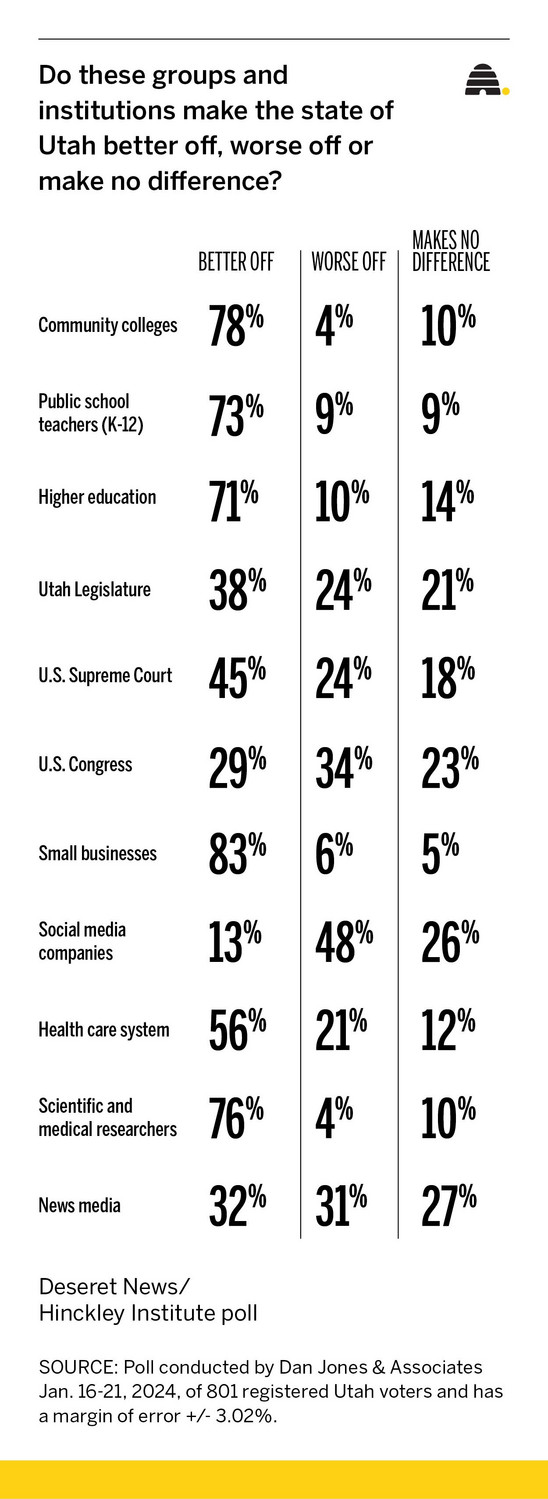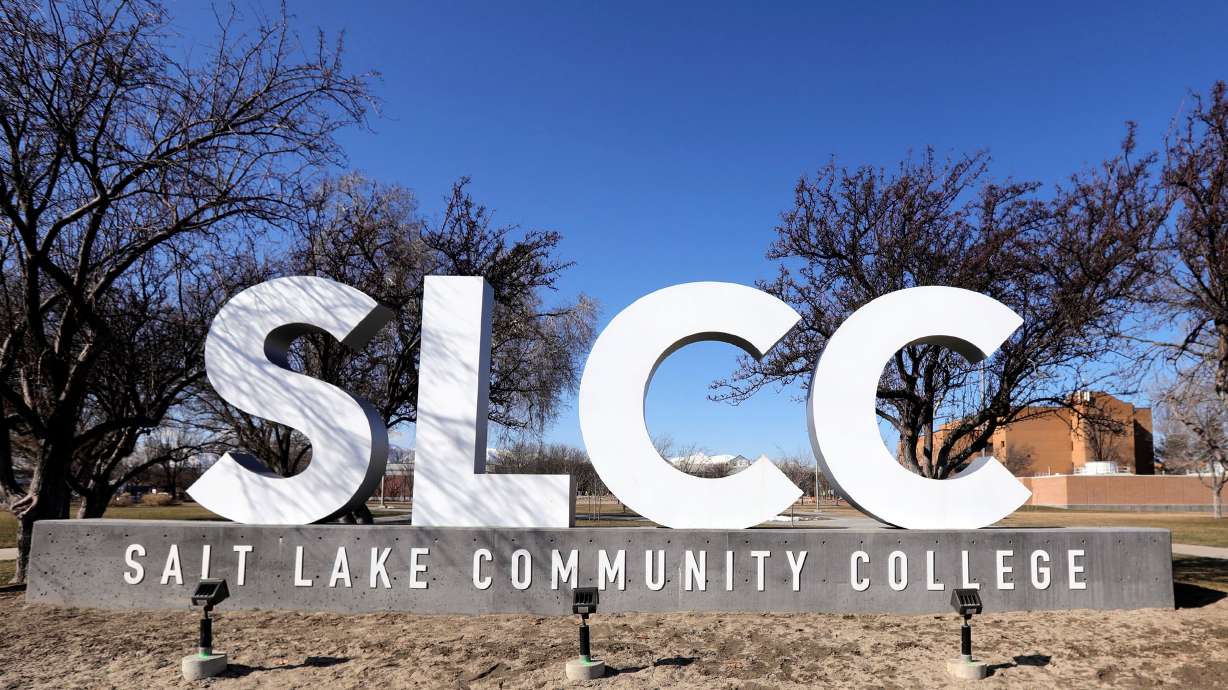Estimated read time: 6-7 minutes
This archived news story is available only for your personal, non-commercial use. Information in the story may be outdated or superseded by additional information. Reading or replaying the story in its archived form does not constitute a republication of the story.
SALT LAKE CITY — Institutions play a critical role in every individual's life as the primary tool to provide structure to society and, at the most basic level, get things done.
But across the U.S., the collective faith in societal institutions has been waning for decades and, for most categories, hovers at or near all-time lows.
An annual national survey conducted by Gallup and going back to the late 1970s found confidence in government institutions, public education, health care providers, big business, law enforcement and most other categories has been in steady decline, with the overall average confidence level registered by U.S. adults deteriorating from 48% in 1979 to 26% in 2023, the lowest ever.
A shared and common 'good feeling'
New statewide data gathered by the Deseret News in partnership with the University of Utah's Hinckley Institute of Politics found Utahns are more optimistic about institutions, in general, but show full agreement when it comes to the category that has the most perceived positive impact on society: small businesses.
And that's a data point that comes as no surprise to Salt Lake Chamber President/CEO Derek Miller.
"This is a measure of how people feel about Main Street America," Miller said. "And their own Main Streets. It's right up there with love of country, motherhood and apple pie. There's a shared, and common, feeling about the good small businesses do and their positive contributions. We all know someone that owns a small business or works for one. These are our neighbors, our friends and our family members and they represent businesses we all know about and frequent."
One of the reasons for those ubiquitous personal connections between individuals and Utah small businesses boils down to math. There are, quite simply, a lot of them.
According to the latest data from the U.S. Small Business Administration, Utah had over 330,000 small businesses registered as of March 2022. And while the business administration categorizes any business with 500 or fewer employees as "small," the overwhelming majority in Utah have 20 or fewer employees and over 260,000 are operated by single individuals. Collectively, those small companies make up over 99% of Utah's overall business sector, according to the Small Business Administration, and account for more than 45% of Utah employees.
"When we say that small businesses are the backbone of the Utah economy, it's very true," Miller said.
While the Deseret News survey did not explore Utahns' sentiments on other general business categories, Gallup found national confidence in "big business" came in at 14% in 2023. Miller said the disparity points out an essential difference in how small businesses are perceived by the general public.
"What are people seeing as the difference between big and small businesses?" Miller asks. "I've got to believe there is just fatigue in all of the political division and warfare we're experiencing on a daily basis. Often, big businesses get pulled into that, into the political and culture wars. But small businesses mostly are not. Small businesses are spending all day working hard to provide good service and keep their heads above the water."

Red versus blue
The partisan divide showed up in the Utah survey data in both expected and, perhaps, unexpected categories.
The Utah Legislature's Republican supermajority likely helped drive a disparity in responses on sentiment for that institution, with 46% of self-identified GOP respondents giving it the "better off" ranking while only 27% of Democratic respondents said the same. Likewise, the U.S. Supreme Court, with its 6-3 conservative majority earned a "better off" response from 54% of Republicans but only 31% from Democrats. Sentiments about the U.S. Congress reflected less party division as 34% of Republicans said the institution of federal lawmakers left Utah "better off" and 27% of Democrats agreed.
Jason Perry, director of the Hinckley Institute of Politics and the U.'s vice president of government relations, said partisan differences also showed up in assessments of educational institutions, where Republicans tracked around 10 percentage points lower than Democrats on "better off" rankings, but K-12 education, higher education and community colleges all earned overwhelmingly positive responses in the survey. K-12 garnered 73% "better off" rankings, higher education 71% and community colleges 78%.
"I think this is entirely consistent with the Utah approach," Perry said. "Our legislators put an incredible amount of money into public education ... and the leaders are very involved. Even coming out of a nationwide pandemic, Utahns still feel like we're better off because of our public education systems."
Perry also noted that Utahns' sentiments on major institutions tracked higher, when taken as a whole, than the Gallup data even as the state's survey respondents had a shared pessimism on some of the lowest-ranking institutions.
"I think, overall, the view through the eyes of the average Utahn is more positive overall than the rest of the country," Perry said. "More confident, and particularly in those areas that we can invest in, like education."
Social media companies earned the least favorable assessments from Utahns. Only 13% say the state is "better off" with social media, while 48% say it is "worse off."
Congress followed next, with 34% of respondents saying the state is "worse off" and 29% "better off." And the news media weren't far behind, with a nearly even divide in "better off" and "worse off" rankings, 32% to 31%, respectively. Gallup found only 18% of Americans in its 2023 national polling gave newspapers a high confidence rating and TV news fared even more poorly at 14%.
All the news that's fit to hate
BYU communications professor Joel Campbell said he was encouraged by the high rankings earned by Utah educational institutions in the survey but not so much by the dismal performance of the news business.
"I get concerned, being a media guy and former journalist, that the news media is taking it on the chin here," Campbell said. "I believe the news media is central to our democracy and performs an essential watchdog role."
Campbell said he believes the low confidence in news reporting registered by poll respondents is a reflection of wider dialogues happening in the political realm and elsewhere about perceived bias, and those negative commentaries are piled on legacy news business models that have struggled amid the rise of social media and other digital news delivery systems.
"Unfortunately, the negative ranking does kind of line up with societal trends and a political structure that is often talking about the news media," Campbell said. "That's happening alongside news media companies' revenue crisis. Many in the public believe news media are biased or misreporting.
"We're in a double-bind from a business standpoint and a public trust standpoint."
But Campbell said he believes the news industry is on a pathway to better footing, from a business viability standpoint, and is confident that the institution is still viewed as valuable, and particularly so when it comes to confidence in local news gathering versus national outlets, a distinction that wasn't made in the Deseret News/Hinckley Institute polling.
He also noted Utah is outperforming many other places when it comes to news coverage, noting the multiple outlets that faithfully cover state government and the continued existence of the state's two legacy daily newspapers, the Deseret News and Salt Lake Tribune.
"I'm optimistic," Campbell said. "I think that journalism will survive and that its critical role in democracy will survive. News outlets in Salt Lake City, and Utah as a whole, are outstanding and we still have a very good media environment here."










